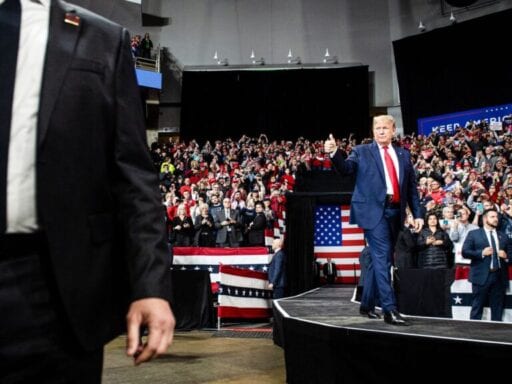The big question: Will Trump win all the votes, or almost all the votes?
There are GOP primary caucuses taking place on Monday in Iowa, too.
Even after a host of other primary states canceled their Republican primaries to help President Trump with his reelection campaign (as some states did in 2004 for George W. Bush), the Iowa Republican Party announced in September that it would go ahead with caucuses. Republicans will vote at 7 pm Iowa time at caucus locations.
Trump will face former Massachusetts Gov. Bill Weld and former Republican Rep. Joe Walsh. Current polling has Trump leading Weld by 86 points nationally (though by a mere 76 points in New Hampshire), and Weld and Walsh have just over $2 million in fundraising combined, while Trump raised $46 million in the last quarter.
But while Trump’s Republican opposition is fairly minimal and the president remains deeply popular with Iowa Republicans, the White House is taking the caucuses seriously. The campaign is sending 80 surrogates — including Donald Trump Jr. and White House acting Chief of Staff Mick Mulvaney — to Iowa, part of a show of strength meant to indicate how ready the Trump campaign is for 2020.
Sarah Matthews, deputy press secretary for the Trump campaign, told me, “The Iowa caucuses are a good workout for our ground game and an opportunity to flex the organizational muscles of President Trump’s operation.”
We’ll be covering the results live, in partnership with Decision Desk:
Meet Trump’s GOP opposition
Suffice it to say, neither Walsh nor Weld has much chance against Trump. Walsh has already announced that he will not be on the ballot in his home state of Illinois, citing a lack of resources and the need to focus on Iowa and New Hampshire. I’ve contacted Weld and Walsh for comment and will update if and when I hear back.
“Part of it is that we have to convince a lot of the Republican donors that there is a viable option and they’re going to want to see results before they put money into our organization,” a spokesperson told the Chicago Sun-Times. And while Weld has polled well in New Hampshire, his numbers are far outmatched by Trump’s.
But victory isn’t necessarily the point of either man’s long-shot bid for the White House. Rather, their campaigns are intended as signals to Trump-skeptical Republicans that they’re not alone in their opposition to the president.
For Weld, his focus is on restoring “normalcy” to the Republican Party as a “real Republican.” When I spoke with the former governor back in August and asked him about Trump’s considerable popularity with the GOP, he told me, “I’m not willing to concede your premise. I will concede that I’m a normal Republican, and the implication of that is that Mr. Trump is a Republican in name only.”
He believes Republican voters are looking for fiscal conservatism and a small-government ethos from a presidential candidate willing to “stand up for the taxpayer.”
Weld has a lengthy political history, as I detailed last year:
He served as the Republican governor of Massachusetts from 1991 to 1997 — a popular tenure for a moderate Republican in a blue state, though with some controversy among conservatives who decried the expansion of government that took place under his watch.
He helped George W. Bush prepare to debate John Kerry in 2004, but endorsed Barack Obama in 2008 after Mitt Romney, himself a former Massachusetts governor, dropped out of the race (Weld was a co-chair of Romney’s campaign efforts in New York).
In 2016, Weld ran for the vice presidency as Gary Johnson’s running mate on the Libertarian Party ticket.
Former Illinois Rep. Walsh, on the other hand, is running as a chastened former Trump ally who said that while “I helped create Trump, there’s no doubt about that,” Trump “represents the absolute worst of us.” But that message hasn’t found traction, perhaps in part because of Walsh’s conspiratorial past.
… it wasn’t actually all that long ago that Walsh was saying things that now seem markedly Trumpian — and far worse. As others have noted, the period of Walsh’s political life during which he contemplated extraconstitutional violence if Hillary Clinton won the presidency corresponded with the time when Walsh engaged in rank racism and bigotry, particularly on Twitter. As recently as February 2018 — which was, for the record, just 18 months ago — Walsh was promoting conspiracy theories about Barack Obama’s religious persuasion, saying repeatedly and without evidence that Obama was a Muslim.
In an interview with ABC News’s George Stephanopoulos last August, Walsh said of his past remarks, “The beauty of what President Trump has done is he’s made me reflect on some of the things I’ve said in the past. I had strong policy disagreements with Barack Obama, and too often I’ve let those policy disagreements get personal.”
Author: Jane Coaston
Read More



